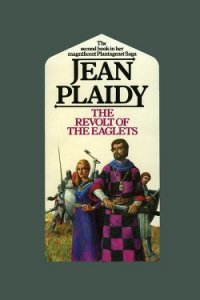Spain for the Sovereigns - Plaidy Jean (читать книги TXT) 📗
‘I see,’ said Luis slowly, ‘that the Queen could not find the means to fit up this expedition.’
‘Alas, it is so,’ said Ferdinand, but he was thoughtful.
Ferdinand had now become convinced that there was too much at stake to allow Cristobal to offer his plans elsewhere.
He said to Isabella: ‘The man’s demands are arrogant, but if he is unsuccessful he gets nothing. What harm would there be in making him our Admiral and Viceroy of lands he discovers? For if he discovers nothing the tide is an empty one.’
Isabella was pleased; she had always been in favour of the man and was delighted as always when Ferdinand veered round to her way of thinking.
‘Then,’ she said, ‘when we can muster the money we will send him out on his voyage of discovery.’
‘When will that be?’ asked Ferdinand. ‘I do not think this man will remain here much longer. He has as good as said that if there is any more delay he will begin his journey into France.’
The thought of the French’s benefiting by new discoveries so agitated Ferdinand that Isabella said: ‘If I had not already pawned my jewels to pay for the war, readily would I do so to finance this expedition. The treasury is very low. I doubt whether there is enough money in it for what he will need.’
Ferdinand, who had been walking agitatedly about the room, stopped short as though he had come to a sudden decision.
‘There is something I have to tell you, Isabella,’ he said. He called to one of the pages: ‘Send for Don Luis de Sant’angel at once,’ he said.
‘You think you know of a means to obtain this money?’ Isabella asked him.
Ferdinand lifted a hand and slowly nodded his head. But he did not speak, and Isabella did not press him.
Within a few minutes Luis de Sant’angel was standing before them.
‘You are very interested in this man, Cristobal Colon,’ said Ferdinand. ‘You feel certain that his voyage will be successful.’
‘I do, Highness,’ said Luis.
‘You talked to me recently about money . . . money you have in Aragon.’
Luis looked rather puzzled, but Ferdinand hurried on: ‘You would be prepared to help in financing this expedition which Colon wishes to make?’
Ferdinand was now looking intently into the face of his Secretary of Supplies, and Sant’angel, after long experience of his master, understood.
Ferdinand wished this voyage to be made; he knew that delay was dangerous. He was gong to finance it from the treasury of Aragon, but Isabella and Castile must not know that, during the time they had been urgently in need of money, Ferdinand had kept amounts of money separate from those of Castile to be used in the service of Aragon.
Any discoveries Cristobal Colon made would be for the good of Aragon as well as Castile. Therefore what Ferdinand was suggesting was that the money should be provided by Aragon, but that it should be advanced in the name of Luis de Sant’angel.
Luis felt a great uplifting of his spirits.
Cristobal Colon, he thought, at last you are about to have your chance!
‘Since,’ said Ferdinand, ‘you are so generous, Sant’angel, you had better send Colon to us with all speed. We will grant his request, and he shall set about his preparations without further delay.’
Luis retired as quickly as he could and went in search of Cristobal; but the explorer was nowhere to be found.
All through Granada, all through Santa Fe the question was being asked: ‘Have you seen Cristobal Colon?’
At last it was discovered that he had packed his few belongings and had left. He had said that he would not be back; he was leaving Spain, since Spain had no use for him.
Luis was nonplussed. It must not be that, when success was about to come to Cristobal after so many years of waiting, he was to lose it through giving in a day or so too soon. Luis was determined that it should not be so.
He wondered which way Colon had gone. He would go, he believed, in the direction of La Rabida, as he would certainly wish to see Diego before he left Spain. His other son, Ferdinand, had a mother to care for him, but he would want to make some provision for Diego.
Yet perhaps he had decided he could not afford to waste more time and was hurrying northwards to France!
Luis therefore dispatched riders in several directions and one of these overtook Cristobal six miles from Granada at the Puente de Pinos.
Cristobal heard the sound of horses’ hoofs thudding behind him as he made his way towards the bridge. He slackened his pace, and hearing his own name called, stopped.
‘Cristobal Colon,’ he was told, ‘you must come back to the Court with all speed. You are to be granted all that you ask, and can make your preparations at once.’
A smile touched Cristobal’s face, and it was so dazzling that it made of him a young man again.
At last. . . success. The long waiting was over.
The roads to the coast were thick with bands of refugees. Old and young, those who had been accustomed to the utmost luxury, those who had been bred in poverty, now walked wearily together; they had been stripped of all they possessed, for although they had been allowed to sell their property, they had been cynically forbidden to take money out of the country.
This was the exodus of the Jews of Spain. Onward they trudged, hoping to find some humane creatures who would be kinder to them than those in the land which for centuries had been the home of their ancestors.
It was forbidden to help them. It was no crime to rob them.
The shipmasters looked upon them as legitimate prey. Some took these suffering people aboard, extracted payment for the voyage and then threw their passengers, who had trusted them, into the sea.
From all parts of this all-Christian Spain those Jews who refused to conform to the Christian Faith wandered on their wretched way to an unknown future.
Thousands died on many a perilous journey; some of plague, but many of barbaric murder. The rumour, that it had become a practice of these Jews to swallow their jewels in the hope of preserving them, was circulated and numbers of them, on arriving in Africa, were ripped up by barbarians, who hoped in this way to retrieve the jewels from their hiding-places.
Some, however, found refuge in other lands, and a few managed to survive the horror.
Torquemada was satisfied. He had had his way.
He knelt with the Sovereigns and they prayed together for the continued greatness of their all-Christian state.
In a room over a grocer’s shop in the town of Seville a woman saw the Jews gathering together to leave their homes.
She looked from her window upon them, for she was too ill to leave her room, and she knew that only a few more weeks of life were left to her.
Those faces, on which were depicted blank despair and bewildered misery, took her mind back to the days when she, a Jewess, had lived in her father’s luxurious house; and with a sudden, terrible fear she began to wonder what part she herself had played in bringing about this terrible crime which was taking place all over Spain.
What if she had not taken a lover; what if she had not been in fear that her father would discover her pregnancy? What if she had not betrayed him and his friends to the Inquisition – would this be happening now?
It was a terrible thought. She had not allowed herself to think of it before, although it had always been there hovering in her mind, hanging over her life like a dark shadow of doom which she could not escape for ever.
If Diego de Susan had not been betrayed by La Susanna, if his conspiracy against the Inquisition had succeeded, who knew, the Inquisition might not have taken hold in Spain as it had this day.




